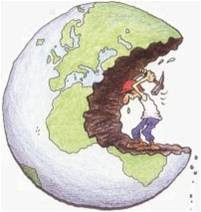This past week, DJPC joined sister organization CISPES and over 130 social movement organizations in Guatemala, Honduras, El Salvador and the United States calling on Congress to seriously re-consider US economic policy towards Central America. Check out the press release below.
Economic inequality is one of the main drivers of instability throughout the isthmus and it fuels everything from gang violence, to corruption, to immigration. For more than a century, the US has promoted economic policies that benefit local elites and US corporate interests. Why then, is the Biden administration trying to sell us the same economic policies as new? No need to read further? Take action here!
The historic role of US development “aid” towards Central America has been to subsidize the extraction of cheap labor by local elites, corporations and the private sector and ensure the flow of natural resources northward.
Right now, the House and Senate Appropriations Committees are drafting the spending bills that will determine how much money will be allocated towards the region – and for what. Land and water defenders, Indigenous leaders, unionists and human rights defenders in El Salvador, Guatemala and Honduras – and solidarity allies in the U.S. – are calling on Congress to STOP fueling exploitation.
With Biden calling for more funding, NOW is the time to call for serious changes to US economic policy towards Central America. Will you join us in calling for an end to predatory US development aid, by contacting your Representative and Senators now?
For Immediate Release:
U.S. faith, solidarity and immigrant rights organizations join letter to Congress amidst discussions of Biden’s funding request for Central America; Urge Re-Consideration of Development Aid
June 15, 2021
Washington, DC – On the heels of Vice-President Harris’ first trip to Central America, over 130 organizations in Guatemala, Honduras, El Salvador and the United States are urging Congress “re-consider several key aspects” of U.S. economic development assistance towards the region.
A “good-faith effort” by the U.S. to address the root causes of forced migration from Central America, they wrote in a letter to the chairs of the House and Senate Appropriations Committees, “would begin with a process of awareness and accountability for how the United States has, historically and in recent years, contributed to the current conditions in El Salvador, Honduras and Guatemala that continue to cause thousands of people to have to leave their homes in order to survive.”
Current U.S. policy has “far too often” contributed to the poverty, hunger that has become the principal driver of migration from Honduras, Guatemala, and El Salvador by teaming up with the private sector to promote and finance infrastructure projects that displace communities from their ancestral lands and destroy local ecosystems.
The groups cite a partnership between the U.S. Agency for International Development (USAID) and the company behind the Agua Zarca dam in Honduras, for which Indigenous leader Berta Caceres was murdered in 2016. David Castillo, who was CEO of DESA, the company financing the dam, is currently on trial for her murder; two other employees have already been convicted.
Directly impacted communities in the region say that U.S. financial and political support for palm oil plantations and hydro-electric dams, as well as facilitating increased corporate control over public services through public-private partnerships have eclipsed the possibility of a dignified life for millions of people.
U.S. and international organizations working on policy toward the region are calling on Congress to put restrictions on the additional funding that the Biden administration has requested to address the root causes of migration.
“Though discussed in terms of being an engine for economic development, at the end of the day, the benefits are very limited and contribute to rising inequality and to the concentration of wealth and power in the hands of the elite,” they wrote, adding that, “The United States bears its share of the responsibility for these outcomes both through its weight at multilateral banks and other international financial institutions but also through its own foreign policy that is carried out through USAID, the State Department, and other agencies.”
The House Committee on Appropriations is expected to begin drafting spending bills this month.
Signers include leading Indigenous and Black land defenders in Honduras like the Civic Council of Popular and Indigenous Organizations of Honduras (COPINH) and the Black Fraternal Organization of Honduras (OFRANEH), national faith organizations like the American Friends Service Committee and Leadership Conference of Women Religious, policy and legal organizations like the Center for Economic and Policy Research (CEPR) and the National Lawyers Guild’s Task Force on the Americas, and immigrant rights organizations led by Central Americans, including the National Day Laborers Organization (NDLON) and the Central American Resource Center of Los Angeles (CARECEN).
Letter and full list of signers available for download here.
For media inquiries contact, Samantha Pineda, [email protected] or call (202) 521-2510 ext. 204
